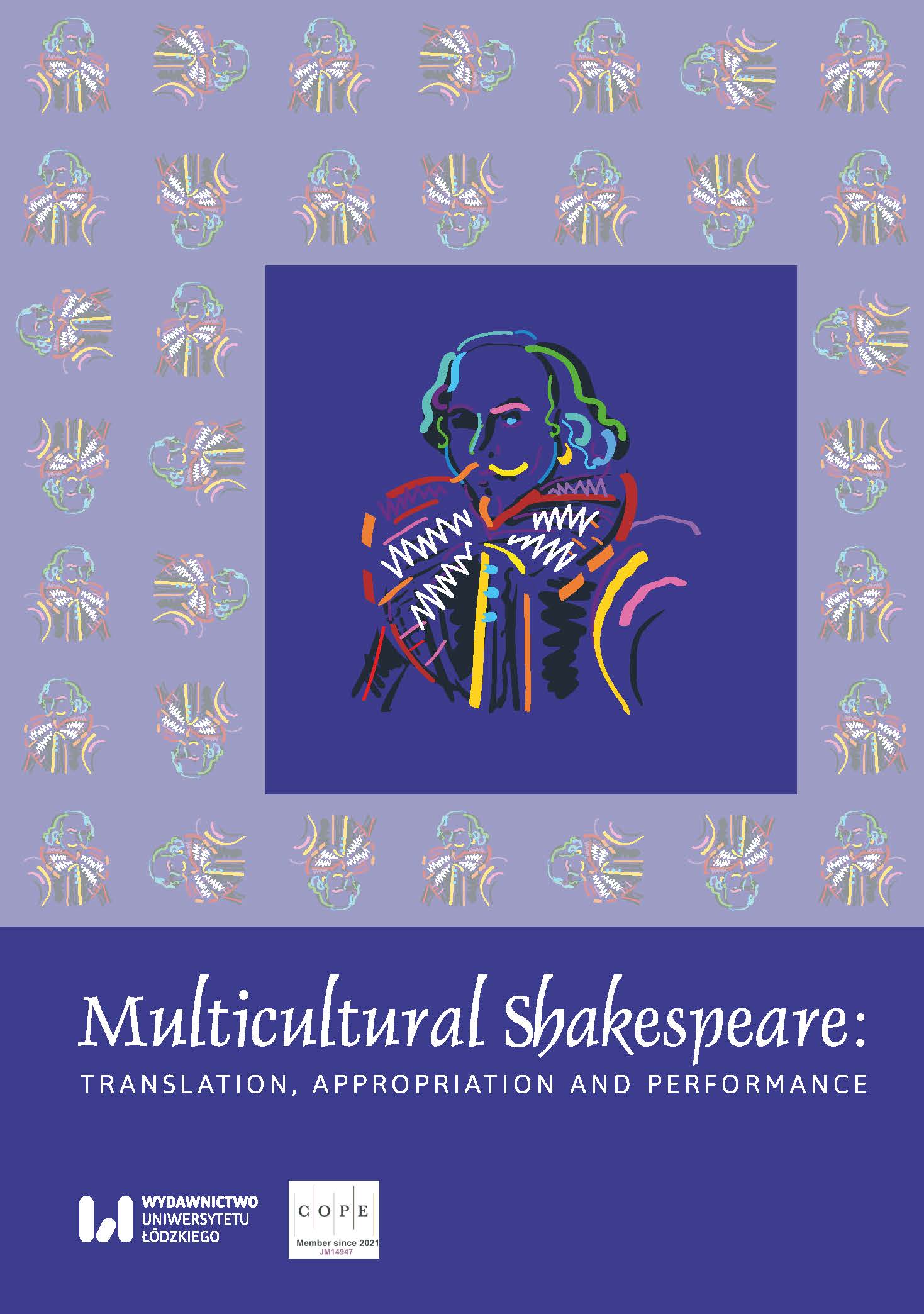From Metaphor to Metonym: Shakespearean Recognition in the United States University
DOI:
https://doi.org/10.18778/2083-8530.27.11Keywords:
Shakespeare, Berkeley, college curriculum, English major, canonization, recognition, metonymAbstract
This essay historicizes the Shakespeare curriculum at UC Berkeley’s English department over the last one hundred years. An elite research university in the United States, UC Berkeley’s extensive course offerings have expanded due to changes in undergraduate education and external cultural shifts. With a growing number of courses on sexuality, race, gender, etc., that became part of the purview of an English department, the teaching of Shakespeare expanded as well. I demonstrate how the emphasis on Shakespeare in the U.S. undergraduate curriculum shifts over time from one form of recognition—an acknowledgement of his value or worth—to a recognition of identifying with his work based on prior experience. Distinguishing between courses that combine “Shakespeare and” and those that combine “Literature and,” I expose the consequences each has for the canonicity of both Shakespeare and subject fields with which his works are placed in conversation, explicitly and implicitly. I argue that the expansion of Shakespeare in the American undergraduate curriculum coincides with and depends on the compression of key aspects of interpretation that pose challenges for the new knowledges it seeks to create. I illuminate how an expanded Shakespeare curriculum saw a compression of Shakespeare into metonymic mythic status, which has implications for the teaching of literature from various identity and cultural groups. I demonstrate how the origins of an expansive undergraduate Shakespeare curriculum in the United States positions Shakespeare as the interlocutor for a wide range of topics.
Downloads
References
Abramovitch, Seth. “The Top 25 Drama Schools in the World.” The Hollywood Reporter. 18 June 2022. https://www.hollywoodreporter.com/lists/the-top-25-drama-schools-in-the-world/. Accessed 1 November 2022.
Google Scholar
Assmann, Aleida. “Canon and Archive.” A Companion to Cultural Memory Studies. Eds. Astrid Erll and Ansgar Nünning. Berlin: DeGruyter, 2008. 97-108.
Google Scholar
DOI: https://doi.org/10.1515/9783110207262.2.97
Bayer, Mark. “Henry Norman Hudsom and the Origins of American Shakespeare Studies.” Shakespeare Quarterly 68.3 (Fall 2017): 271-95.
Google Scholar
DOI: https://doi.org/10.1353/shq.2017.0029
Berkeley Academic Guide and Schedule of Classes Archive. Guide.Berkeley.edu. https://guide.berkeley.edu/archive/. Accessed 20 November 2022.
Google Scholar
“Best National University Rankings,” U.S. News and World Report. USNews.com. https://www.usnews.com/best-colleges/rankings/national-universities/. Accessed 28 December 2022.
Google Scholar
Boal, Augusto. Theatre of the Oppressed. Trans. Charles A. and Maria-Odilia Leal McBride. London: Pluto Press, 1979.
Google Scholar
Burton, “Shakespeare in Liberal Arts Education.” News. Whittier College. Fall 2013.
Google Scholar
“California Community Colleges By Tuition Cost,” Community College Review. Community CollegeReview.com. https://www.communitycollegereview.com/ tuition-stats/california/. Accessed 28 December 2022.
Google Scholar
Cantor, Paul A. “Shakespeare-‘for all time’?” Public Interest. Issue 110. Winter 1993. 34-48.
Google Scholar
Coeyman, Marjorie. “In Love With Shakespeare.” The Christian Science Monitor. https://www.csmonitor.com/2002/0528/p13s02-lecl.html/. Accessed 28 May 2002.
Google Scholar
Dawson, Anthony B. “Performance and Participation: Desdemona, Foucault, and the actor’s body”. Shakespeare, Theory, and Performance. Ed. James C. Bulman. London: Routledge, 1996. Print. 29-45.
Google Scholar
DOI: https://doi.org/10.4324/9780203360071_chapter_3
“Film and Media at Berkeley.” Department of Film & Media, UC Berkeley. https://filmmedia.berkeley.edu/. Accessed 20 December 2022.
Google Scholar
Gutierrez, Miguel, Nadine Georges-Graves, Guisela Latorre and Shannon Winnubst. “Does Abstraction Belong to White People?” Moderated by Joni Boyd Acuff. Wexner Center for the Arts, The Ohio State University, YouTube video, 1:40:31. https://www.youtube.com/watch?v=mYkiKEcRUKE/. Accessed 23 January 2020.
Google Scholar
Haughey, Joseph. “The History of Shakespeare in American Schools.” Shakespeare Unlimited. https://www.folger.edu/podcasts/shakespeare-unlimited/history-of-shakespeare-in-schools/. Accessed 7 January 2020.
Google Scholar
Manoff, Marlene. “Theories of the Archive from Across Disciplines.” Portal: Libraries and the Academy 4.1 (2004): 9-25.
Google Scholar
DOI: https://doi.org/10.1353/pla.2004.0015
Maxwell, Lynn. “’Shakespeare for All times and Peoples:’ Shakespeare at Spelman College and the Atlanta University Center.” Journal of American Studies 54.1 (2020): 66-73.
Google Scholar
DOI: https://doi.org/10.1017/S0021875819002032
Mazer, Cary M. Double Shakespeares: Emotional-Realist Acting and Contemporary Performance. Madison: Farleigh Dickinson University Press, 2015. Print.
Google Scholar
Menzer, Paul. “The Laws of Athens: Shakespeare and the Campus Economy.” Shakespeare on the University Stage. Ed. Andrew James Hartley. Cambridge: Cambridge University Press, 2014. 201-15.
Google Scholar
DOI: https://doi.org/10.1017/CBO9781107262218.013
Mullaney, Steven. The Place of the Stage: License, Play, and Power in Renaissance England. Chicago: University of Chicago Press, 1988. Print.
Google Scholar
“myth, n.” Oxford English Dictionary, Oxford University Press, July 2023. https:// doi-org.proxy-um.researchport.umd.edu/10.1093/OED/5411360879/. Accessed 2 January 2023.
Google Scholar
“recognition, n.” Oxford English Dictionary, Oxford University Press, July 2023. https://doi-org.proxy-um.researchport.umd.edu/10.1093/OED/1092821039/. Accessed 2 January 2023.
Google Scholar
“Shakespeare Association of America: 1973 Meeting.” Shakespeare Association of America. ShakespeareAssociation.org. https://shakespeareassociation.org/wp-content/uploads/2013/06/SAA-1973.pdf/. Accessed 10 June 2021.
Google Scholar
Shakespeare on the University Stage, ed. Andrew James Hartley. Cambridge: Cambridge University Press, 2017.
Google Scholar
Smith, Ian and Michael Witmore. “Critical Race Conversations: This is Not Who We Are?” Folger Shakespeare Library. 22 April 2021. https://www.youtube.com/ watch?v=8MZqfAalWrg&t=3401s/. Accessed 1 August 2021.
Google Scholar
Smith, Bruce R. “Teaching the Resonances.” Shakespeare Quarterly 48.4 (Winter 1997): 451-55.
Google Scholar
DOI: https://doi.org/10.2307/2871255
States, Bert O. Great Reckonings in Little Rooms: On the Phenomenology of Theater. Berkeley: University of California Press, 1985.
Google Scholar
DOI: https://doi.org/10.1525/9780520908604
“Theater, Dance, and Performance Studies,” Berkeley: Departments and Programs. University of California History Digital Archives. https://www.lib.berkeley.edu/ uchistory/general_history/campuses/ucb/departments_t.htm/. Accessed 20 De-cember 2022.
Google Scholar
Weiskott, Eric. Meter and Modernity in English Verse, 1350-1650. University of Pennsylvania Press, 2021.
Google Scholar
DOI: https://doi.org/10.9783/9780812297478
Downloads
Published
Versions
- 2023-12-20 (2)
- 2023-11-23 (1)
How to Cite
Issue
Section
License

This work is licensed under a Creative Commons Attribution-NonCommercial-NoDerivatives 4.0 International License.












